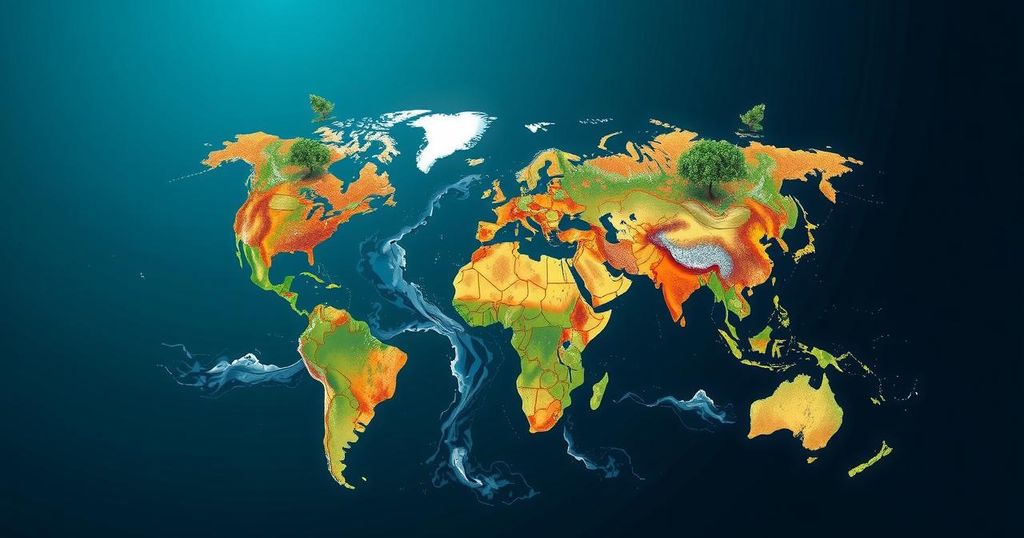COP29: Navigating Climate Talks Amid Global Turmoil
The upcoming COP29 in Baku, Azerbaijan, faces unprecedented challenges due to global conflicts and economic instability. Key discussions will revolve around financial commitments from developed countries to support climate action in developing nations amid mounting pressures for urgent climate pledges. The return of Donald Trump as President of the United States may further complicate negotiations, highlighting the uncertainty of achieving consensus in a divided geopolitical landscape.
The 29th United Nations Climate Change Conference (COP29), scheduled to take place in Baku, Azerbaijan from November 11-22, confronts a perilous timeline against a backdrop of global strife, notably including the ongoing conflict in Ukraine and rising tensions in the Middle East. This year’s conference marks a significant departure from its predecessor held in Dubai, as Azerbaijan’s economic reliance on fossil fuels complicates efforts towards consensus on climate action. Calls for boycotting the conference echo concerns over Azerbaijan’s military actions in Nagorno-Karabakh, yet there exists a lingering hope for meaningful dialogue despite these external pressures. Negotiators at COP29 aim to address pivotal financial commitments that underpin climate agreements, emphasizing the urgency for developed nations to fulfill their pledge to support developing countries with $100 billion annually for climate adaptation and mitigation. Although delays in reaching this goal have marred previous discussions, considerable attention is now focused on establishing a post-2025 funding framework to address rising climate-related needs, estimated in the trillions. Furthermore, the fast-approaching deadline for countries to submit updated climate pledges significantly enhances the stakes surrounding this conference, particularly for those nations most vulnerable to climate change. The structure of COP conferences often allows for the pursuit of consensus amid existing geopolitical tensions. Participants tend to concentrate narrowly on climate negotiations, which foster a unique diplomatic atmosphere. However, the influence of external factors remains evident, as demonstrated by Russia’s sway in securing Azerbaijan as the conference host. Domestic factors, including political unrest in European nations and public skepticism about funding commitments, exacerbate the challenges faced in Baku, potentially hampering cooperation. In light of the recent U.S. presidential election, implications for international climate negotiations are profound. With Donald Trump returning to power, historical resistance to increased climate financing from the United States may overshadow discussions. Experts suggest that the interplay between the European Union and China in these negotiations will be pivotal, particularly amid recent trade tensions. Moving forward, the effectiveness of COP conferences may be scrutinized with growing public demand for tangible results even as collective agreements continue to guide global initiatives against climate change. As COP29 approaches, the anticipation surrounding its outcomes is mixed. Despite the considerable obstacles presented by geopolitical and domestic crises, climate negotiations remain crucial in addressing the global climate emergency. The collective goals articulated within COP conferences create accountability among nations, yet the pressing need for significant reductions in greenhouse gas emissions persists, underscoring the urgency for collective action toward carbon neutrality by mid-century.
The 29th United Nations Climate Change Conference (COP29) occurs amid escalating global tensions, including military conflicts and economic instability, particularly following the recent U.S. presidential election that reinstated Donald Trump. This conference is seen as a pivotal moment to address climate change amidst Azerbaijan’s unique political and economic landscape, characterized by a dependency on oil and gas and calls for boycotts due to human rights concerns. The discussions will address vital financial commitments, especially for developing nations, as they seek to secure necessary funding to combat climate vulnerability.
In summary, COP29 is set against a backdrop of significant geopolitical and domestic challenges. The conference’s success hinges on the ability to navigate these complexities, particularly concerning financial commitments from developed nations and the dynamics between major global players like the EU and China. While the path toward ambitious climate agreements remains fraught with difficulties, the urgency of the climate crisis necessitates that stakeholders strive for decisive action and collaboration.
Original Source: international.la-croix.com




Post Comment